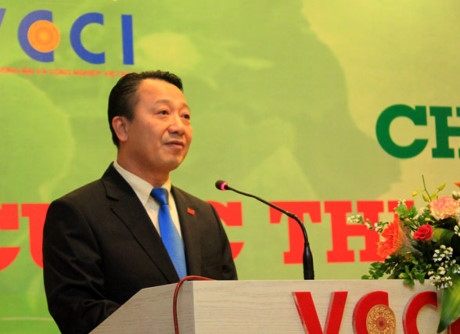.jfif) Opinion
Opinion

Sustainable development is a popular concept for businesses in developed countries. But in Việt Nam, it is still new. Hải Quan (Customs) Newspaper speaks with Nguyễn Quang Vinh, vice general secretary of Việt Nam Chamber of Commerce and Industry (VCCI) on the issue.
 |
Sustainable development is a popular concept for businesses in developed countries. But in Việt Nam, it is still new. Hải Quan (Customs) Newspaper speaks with Nguyễn Quang Vinh, vice general secretary of Việt Nam Chamber of Commerce and Industry (VCCI) on the issue.
In 2010, the Việt Nam Chamber of Commerce and Industry (VCCI) in co-operation with some businesses set up a Business Council for Việt Nam Sustainable Development. Could you see any change of Vietnamese business community’s awareness of the issue?
In fact, since 1999, we have started to introduce the concept of corporate social responsibility and sustainable development to the Vietnamese businesspeople. Since then, the businesses’ awareness about the issue has positively changed.
The VCCI has been playing leading role in supporting Vietnamese businesses to carry out the corporate social responsibilities through series of projects on training capacity enhancement and world experience sharing. Currently, small- and medium-sized businesses’ awareness on sustainable development has been considerably improved.
Notably, many large-scaled enterprises have been actively carrying out the corporate social responsibilities throughout several social and environment projects.
As you mentioned large-scaled enterprises have well done the responsibilities but small-and medium-sized businesses have just been aware of the issue. What are the difficulties to the businesses?
The biggest difficulty to the small and medium businesses is knowledge. In fact, implementing the corporate social responsibilities is not complicated. For example, a business just needs to review manufacturing process to save power, energy, and water. This is knowledge but not expense.
So far, the chamber has given financial assistance through projects just worth about VNĐ5 million (US$220) but the benefit is big. Once, the chamber supported a business to make their workshops’ cool in summer. The project cost VNĐ4 million ($180) but made reduce the workshops’ temperature by 2 degrees Celsius, which helped to lower the expense on electric and water consumption.
Thus, I can say that financial resource was not a hurdle. The chamber’s main task is to set up supporting programmes.
Along with resolutions on working environment and natural resource protection, the criteria of transparency and anti-corruption are important issues during the implementation of the sustainable development. Do you think these are the big hurdles to businesses?
This was the biggest concern. It is because building a transparency and non-corruption business culture is a “mission impossible” at this moment.
Recently, the VCCI has been assigned to carry out a project on building consistency and transparency in business relationship. The chamber has been mobilising active contributions of business community to fighting corruption. We expect to establish an anti-corruption business league, which helps to positively influence to business environment in the country.
Through the league, enterprises could establish many activities and suggest several proposals on anti-corruption to the Government. This will be an important activity of the business community to make contribution to building up a professional and transparent business environment, especially in the period of in-depth international integration.
Do you have any suggestion to improve the sustainable development activity in corporate? Do you think the current legal framework was sufficient enough for doing business?
As my opinion, the legal framework should be further completed to help the activity develop. For example, the Labour Code needs to supplement an item of making report on corporate social responsibilities and sustainable development. The item will show responsibility of making public enterprises’ operation. — VNS




